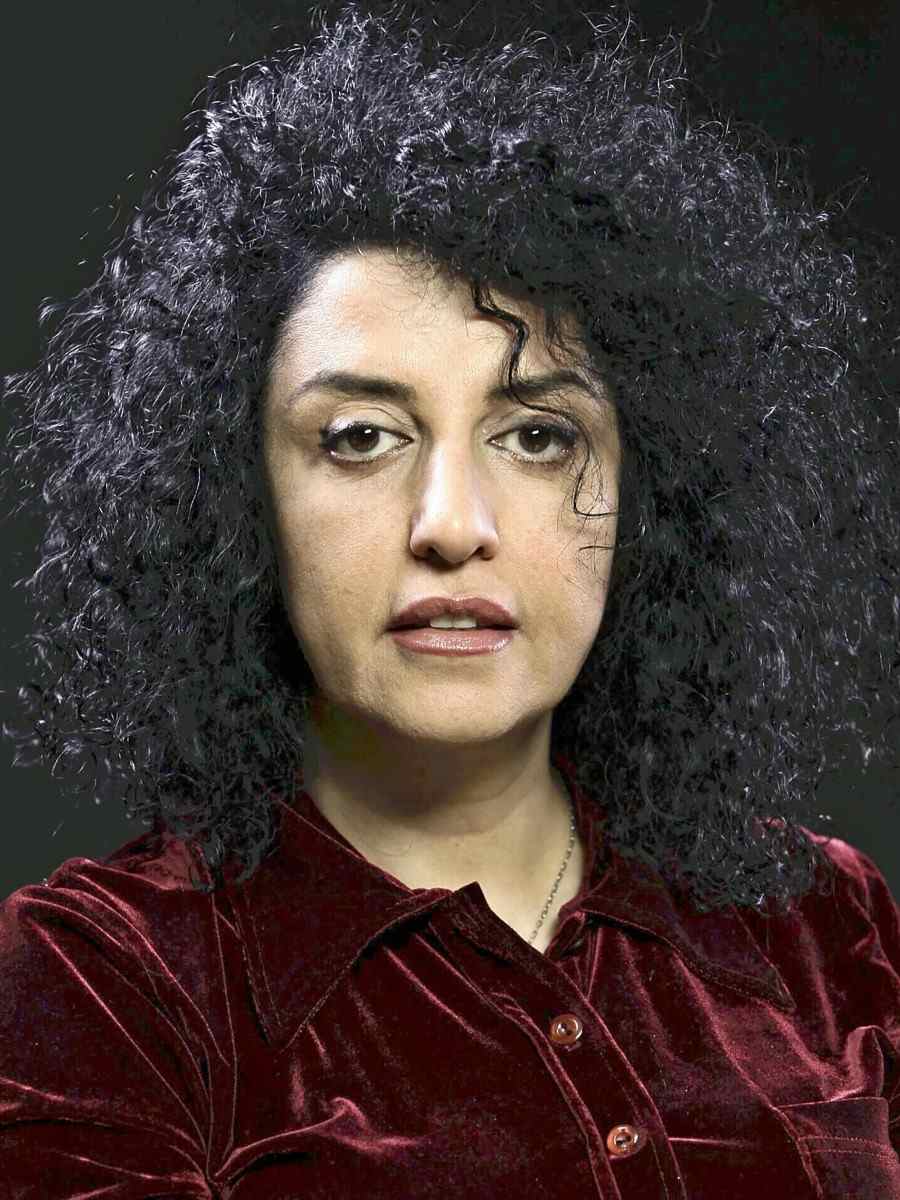Iranian Activist Mohammadi Urges U.N. to Criminalize ‘Gender Apartheid,’ Calls On Advanced Democratic Nations to Use Their Influence

Narges Mohammadi is seen in this photo provided by the foundation in October 2023.
6:00 JST, September 23, 2024
Nobel laureate sends writings from prison to The Yomiuri Shimbun
Narges Mohammadi, an Iranian journalist and human rights activist who was awarded the Nobel Peace Prize in 2023, urged the United Nations to criminalize “gender apartheid,” in writings that she sent to The Yomiuri Shimbun.
The 52-year-old Mohammadi wrote in Persian from a Tehran prison where she is incarcerated. She also called for advanced nations including Japan to exercise their influence on the issue of gender apartheid.
Mohammadi has advocated the protection of the human rights of women being oppressed. Gender apartheid refers to people of one gender committing the inhumane act of institutionally oppressing and controlling individuals of another gender, to maintain the ruling regime.
The term stems from South Africa’s apartheid white supremacy policy, which lasted until the early 1990s.
Mohammadi was sentenced to more than 30 years in prison and 154 lashes for such charges as propaganda against the regime. She was temporarily released and received heart surgery. However, she was returned to prison in April 2022, only about two months after the operation. She has remained in prison since then.
She is being held in Evin Prison, which mainly houses political prisoners. Her writings were passed to The Yomiuri Shimbun through a collaborator.
Titled “Two years from the Mahsa movement,” the writings note Sept. 16, the second anniversary of the sudden death of then 22-year-old Mahsa-Jina Amini, who was detained by police for not wearing her hijab properly.
Amini’s death caused protests against the forcible wearing of the hijab in Iran, which triggered government oppression against such movements.
In her writings, Mohammadi praised the protest demonstrations under the slogan “Woman, Life, Freedom,” saying they are democratic movements and influence Iranian society in both the short and long term.
She also emphasized that policies to oppress women deprive half the Iranian population of human rights and delay democracy, freedom, equality and sustainable development.
In addition, Mohammadi discussed the oppression of women in neighboring Afghanistan. She said it was a top priority for the United Nations to criminalize gender apartheid. To do this, Mohammadi emphasized that it was necessary for democratic advanced nations to exercise their influence at the United Nations, and sought international assistance through organizations such as human rights groups.
Mohammadi was born in Zanjan, northwestern Iran, in 1972. She started writing articles on human rights and issues related to women while she was studying at Imam Khomeini International University. After graduating, she worked for an engineering company and continued to write articles for print media such as a reformist newspaper.
She has repeatedly been arrested and imprisoned since she wrote an article criticizing the government in 1998. She wrote a book titled “White Torture: Interviews with Iranian Women Prisoners” in which she interviews with female prisoners who experienced harsh solitary confinement.
The Iranian government did not allow Mohammadi to attend the Nobel Peace Prize award ceremony in December. Her son and daughter, who live in exile in France, read out the speech she sent from the prison on her behalf.
◇◇◇
Full text of writings by Narges Mohammadi
Two years after the eruption of an Iranian protest movement against compulsory wearing of the hijab, Nobel Peace Prize laureate Narges Mohammadi, currently imprisoned in the country, sent the following piece to The Yomiuri Shimbun. This piece was originally written in Persian and translated by The Yomiuri Shimbun into English.
***
Two years have passed since the killing of Mahsa-Jina Amini and the beginning of the “Woman, Life, Freedom” movement, a movement that came into existence in Iran in the continuation of social movements. Due to its strength, the movement accelerated the pro-democracy, freedom-loving and egalitarian movements of the people.
In the study of the “Woman, Life, Freedom” movement based on the three variables of the structural realm of the movement, its idealistic elements and its performances, it can be concluded that this movement is a fundamentally democratic movement, based on awareness, collective action and wide-ranging historical experiences. It has had short-term and long-term impacts on Iranian society.
In short, and clearly, we can say that nothing since the recent movement is the same as before.
The biggest change has occurred in the field of women’s rights, and the general view toward it.
A long stride has been made in this way, one that is visible compared to other developments in political, social and cultural fields.
The mandatory wearing of a hijab, one of the last and most important targets of ideology for the theocratic government, has been condemned, rejected and at least doubted not only by non-religious intellectuals and socio-political groups and forces but also by religious people.
The public regards the mandatory wearing of the hijab not as a religious duty but as a lever of domination and oppression against women. The fight against it is both to realize women’s right to choose their clothing and to confront the domination and tyranny of the theocratic government.
To put it another way, the realization of democracy and human rights is not feasible as long as the door is closed to women’s rights.
If we are thinking about the realization of democracy and human rights in Iran — one of the major countries in a Middle East full of war and chaos — we must think about the requirements.
From the moral and human rights point of view, a strategy must be adopted that is aimed at the realization of democracy, freedom and equality and eliminating oppression and discrimination against women. This is an undeniable need. Ignoring this will not only deprive half of the country’s population of their human rights, but will delay the realization of democracy, freedom, equality and sustainable development.
Therefore, I believe it should be one of the priorities of the global community to criminalize gender apartheid, of which the women of Iran and Afghanistan are victims, at the United Nations, where democratic and advanced nations hold sway.
Those who seek democracy also have as one of their main goals the existence and continuation of the activities of independent popular civil institutions, because the realization and strength of democracy requires the existence of a powerful civil society. In the [democratic] movement in Iran, powerful civil institutions, organizations and networks, as the structural realm of the movement and the key to its success, have a significant and decisive role.
It is obvious that the will of the Iranian people to transition from a despotic theocratic government and achieve democracy, freedom and equality requires the cooperation and support of pro-democracy movements and international human rights institutions, as well as the attention of the United Nations.
This is the expectation, and taking the first step toward criminalizing gender apartheid will lead to national and global hope.
Top Articles in World
-

Israeli Ambassador to Japan Speaks about Japan’s Role in the Reconstruction of Gaza
-

Videos Plagiarized, Reposted with False Subtitles Claiming ‘Ryukyu Belongs to China’; Anti-China False Information Also Posted in Japan
-

North Korea Possibly Launches Ballistic Missile
-

Chinese Embassy in Japan Reiterates Call for Chinese People to Refrain from Traveling to Japan; Call Comes in Wake of ¥400 Mil. Robbery
-

Russia: Visa Required for Visiting Graves in Northern Territories, Lifting of Sanctions Also Necessary
JN ACCESS RANKING
-

Japan PM Takaichi’s Cabinet Resigns en Masse
-

Japan Institute to Use Domestic Commercial Optical Lattice Clock to Set Japan Standard Time
-

Israeli Ambassador to Japan Speaks about Japan’s Role in the Reconstruction of Gaza
-

Man Infected with Measles Reportedly Dined at Restaurant in Tokyo Station
-

Videos Plagiarized, Reposted with False Subtitles Claiming ‘Ryukyu Belongs to China’; Anti-China False Information Also Posted in Japan























